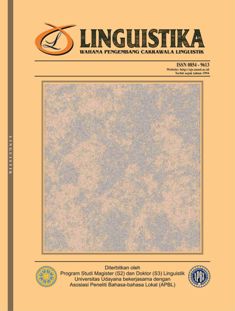Ideologi Ketaatan terhadap Tuhan/roh dalam Tuturan Ireng pada Guyub Tutur Manggarai
Abstrak
This article aims at describing obedience ideology towards The Lord/spirit that exists in ireng utterances of Manggarai Speech Community. Ireng is one kind of prohibiton in Manggarai, transferred verbally from generation to generation. The obedience towards The Lord/spirit is based on dynamism, animism, and belief in the existence of the Highest being as the Creator of all things in the world.
The problem of this article is how the obedience ideology is described through ireng that could be seen through lingual aspects and its meaning. This article uses some ireng utterances as the data collected by interview and questionnaire from Manggarai language speakers in two districts in Manggarai. The method used is conversation through some technics namely interview face to face, questionnaire, recording, and writing. The data is analized by agih and padan method, using the theory of Cultural Linguistics. Data is presented through formal and informal method.
The result shows that there is ireng or prohibition to use the name of The Lord in inappropriate ways to show respect to being the Highest, such as cussing, swearing, and joking using the name of The Lord. There is also a special naming of The Lord, such as Morin agu Ngaran Bate Jari agu Dedek ‘The Lord as the Owner of the world’, Mori Keraeng ‘The Lord’, Jari agu Wowo ‘The Maker’, and Jari agu Dading ‘The Maker of life’. As for the honour to the spirit, it is showed through some ireng, for example not screaming in the garden, and the obligation to perform rituals in farming. The purpose of the obedience to God/spirit is to maintain good relationship with The Lord/spirit in order to have peaceful and prosperous life.




